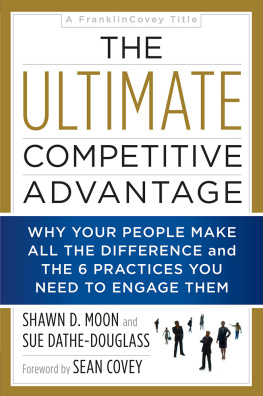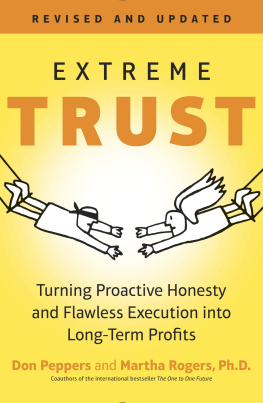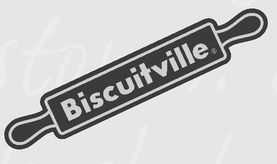Table of Contents
To the Biscuitville family, whose business
behavior serves as a beacon of hope for a better
corporate tomorrow.
Foreword
All throughout the developed world, the corporate community has lost its way. Greed manifested in short-term, quarterly earnings games at the expense of long-term achievement and the lack of leadership in C-suites are at the top of the list of causes.
If the Enrons and Tycos were the left jabs in a high-stakes Wall Street prize fight, then highfalutin derivatives, no equity sub-prime mortgages with their built-in interest rate grenades, and gamblers like Bernie Madoff betting billions of dollars of OPM (other peoples money) were body blows to the solar plexus, causing immeasurable pain to the public trust. Flotsam and jetsam from the backwash of such investment shenanigans will sully financial shores for years to come. The worldwide scene is reminiscent of the all-nighters in The Great Gatsby.
The result is the Great Recession of 2009. It is worldwide, its roots are insidious and history will measure it in years, not quarters. How does the corporate world restore this dashed public trust? We know first-hand that the master legislation named Sarbanes-Oxley in the U.S., and legislation similar to it in other developed countries, has in most cases been an abject failure.
Furthermore, smart money says governments that are becoming more and more the masters of big business will not be the restorers of public trust (or, for that matter, the bottom line).
We need to acknowledge that the fix is not in more legislation. Morals and values cannot be legislated; it will not be management by government that instills probity. Instead, we offer these pages as alternatives, if not answers, to the restoration of public trust using the uniqueness and soundness of Biscuitvilles business recipe (pun intended):
Ethics by example of business leaders. Eschew written ethics policies; live the sermon.
Make decisions with a long-term horizon. Private companies like Biscuitville have a built-in advantage over public companies with 10Q realities.
Work for, not against, social reform.
Include community and neighborhoods as stakeholders.
Focus on civic order.
Empower entrepreneurship and soft leadership skills.
Afford all employees respect, not just vertically but horizontally. People first philosophy, when extended to customers, leads to a sustainable competitive advantage.
In short, business must get back to fundamentals, which Biscuitville, unlike its larger public cousins, never abandoned. Biscuitville has smartly avoided leverage and deal making over its long history, concentrating on active management with rolled-up sleeves. All employees are, in fact, their brothers keeper, even during the storms of business and of life.
Biscuitville is a worthy template for restoring trust in business everywhere.
I would like to express my gratitude to Charlotte Liebig for her incisive editing and for inspiring me throughout the writing of this volume, not only as my editor but also as my long-standing personal friend.
Chapter 1
Gitcha a biscuit...
In the midst of the worst recession in seventy-five years, with trust in business even lower than it was after Enron and the dot-com bust, admiration for the corporate world is in short supply.
On the other hand, those few companies in the world that practice homespun ethics, the seemingly rare few that nurture, develop, train, and treat employees with enduring respect, and the fewer still that are jealously protective of their reputations among employees, community, and the marketplace, deserve to be admired. Any company that continues to perform well ethically, maintain its good name, and preserve its profitability during what could be called The Great Recession of the early twenty-first century will be more admired than the high-octane performers of the boom times. It was precisely because those companies lacked high ethical standards that so many of them faltered and collapsed when the economy began to unravel.
Superior ethical standards are the norm at Biscuitville and are precisely why this vital and growing forty-three-year-young company will exit the gloomy post-recessionary tunnel with more market share, greater employee loyalty, a balance sheet as impenetrable and strong as the Rock of Gibraltar, a highly recognizable brand within their footprint, and a sustainable competitive advantage that is the envy of many of its competitors. Biscuitville is admired by and involved in each of the communities it serves, and its corporate philanthropy is well respected. Biscuitville is a beacon of light in a period of epic economic darkness. And the reason? A loyal customer base coupled with the best biscuits south of the Mason-Dixon line. By what standard should Biscuitville be measured as it lays claim to the top spot on the podium of best quick-serve restaurants? How can Biscuitville, as it surpasses the one-thousand employee mark in 2010, lay claim to becoming one of Fortune magazines Best 100 Companies to Work For? Read on. Biscuitville has all it takes to make that coveted list. The ultimate business thermometer is return on investment (ROI). It will tell you if a company is sick or healthy. Comparing Biscuitville, an Internal Revenue Service (IRS) Section 1372 subchapter S private company (where income is taxed directly to the stockholders), to the Fortune 100 companies might seem a stretch, since all the current 100 are public companies. But with Biscuitvilles pre-tax ROI reaching a high of 58.7% and a low of 40.8% over the last five years, Biscuitville can rightfully claim the ROI gold medal against the most ferocious Fortune 100 competitors on the planet. A more impressive measurement is Biscuitvilles employment scorecard: Biscuitville has never had a company-wide lay-off in its history; it has never furloughed any crew. Lay-offs and furloughs have long-term cost consequences beyond merely the severance costs. Morale suffers horribly. Survivors medical costs spike due to stress, especially concern about job retention. Rehiring and retraining expenses cut into profits. And there is always the possibility that future high-performance C-level executives are swept out in the cuts. People capital is an undervalued and unappreciated asset. It is difficult to measure the value of the human resource from a cost-benefit perspective. At Biscuitville, people relationships - the people first philosophy - are more important than corporate mission. Who is on the bus (people) is more important than where the bus is going (mission). Thats what makes this company tick. All employees learn about the importance of respecting each other. And respect goes in all directions, not just vertically: top to bottom, side to side, and out to the customers.












